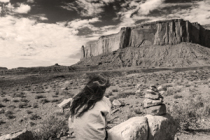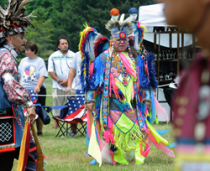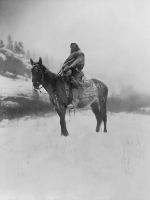Native American news
Indian tribes are retaking jurisdiction over
domestic violence on their own land
American Bar Association
April 1, 2015
By Lorelei Laird
Diane Millich was only days into her marriage when her husband first hit her. So began her year of "horrific terror."
Millich, a member of the Southern Ute tribe of southwestern Colorado, called tribal police many times from her home on the reservation. But because her husband was not an
American Indian, tribal police had no authority over him. Colorado’s La Plata County overlaps the reservation, but county sheriffs had no jurisdiction over crimes committed against Indians on Indian
land.
"After one beating, my ex-husband called the tribal police and the sheriff’s department himself, just to show me that no one could stop him," she recalled during the
signing ceremony for the 2013 reauthorization of the Violence Against Women Act, first passed in 1994...read more
American Indians challenging eagle feather rules
get a boost from Hobby Lobby ruling
ABA Journal Law News Now
By Lorelei Laird
January 1, 2015
In many American Indian religions, the eagle is considered a link to the creator and the spirit world. Its feathers are an important part of rituals, facilitating spiritual or physical purification.
But in the 21st century, acquiring eagle feathers is more a bureaucratic than a spiritual matter. Because the Bald and Golden Eagle Protection Act outlaws killing eagles, or even picking feathers off the ground, new feathers may be acquired only through the National Eagle Repository. At its facility, located near Denver and run by the U.S. Fish and Wildlife Service, workers fill orders using eagles found dead in the wild.
Native religious practitioners have long complained about this system. It's slow, they say. The repository's website says it takes three to six months to fill an order for loose feathers and two to five years for a whole bird. And whole eagles have limited usefulness because they often arrive partly decomposed, critics say.
But the biggest criticism of the repository is perhaps that not everyone can use it. Fish and Wildlife Service regulations say only members of federally recognized tribes may apply for permits, which are required to place an order. And federal recognition is notoriously slow, taking decades in some cases. read more
UN Investigates US -- Finally!
by Karen Garcia
April 22, 2012
For the first time in history, the United Nations is launching a human rights investigation within the borders of the United States -- specifically, a probe into the
often-abysmal living conditions of 2.7 million native Americans. We are just now hearing about this, exclusively, from the U.K.'s Guardian. I guess it is too much of an embarrassment for the Administration's usual
suspects corporate media mouthpieces to give it so much as an inside-page paragraph. It might take attention away from the Secret Service scandal or presidential fund-raising stats.
Finally. The rest of the world will learn that the greatest, most wonderfully exceptional country on earth is, in reality, a third world backwater of a banana republic
when it comes to how it treats many of its poor and indigenous people. When the USA signed on to the U.N. mission in 2010 to explore the plight of the word's native populations, little did it know it
would be included in the inquiry. The Americans kind of assumed the U.N. would be concentrating on the South American populations. After all, when our president talks about poverty and human rights
abuses in his periodic oratories to the General Assembly, it's always about problems elsewhere.
The domestic probe, starting on Monday, will be led by James Anaya, the UN special rapporteur on indigenous peoples. According to The Guardian's Ewan MacAskill, the
investigation is likely to strike a sensitive chord amongst our elite political class read more
If Obama Is Serious About
American Indians, He'll Offer More Than Eagle Feathers
The Atlantic
Andrew Cohen
December 2, 2011
It's a nice gesture to reassure tribes about their religious use of eagle feathers -- but if that's the best the Administration can do for American Indians, it's
not enough
President Barack Obama meets with American Indian leaders this afternoon in Washington but, on the law front, it's already been a tough year for the tribes. In February,
the president nominated Arvo Mikkanen, an Ivy-educated Native American, to a spot as a federal trial judge in Oklahoma. He would be only the third documented Native American federal judge in U.S.
history. But GOP Senator Tom Coburn immediately blocked the nomination and, nine months later, Mikkanen still hasn't received a hearing, much less a floor vote. Worse, no one in Washington seems to
care. read more



































































































































